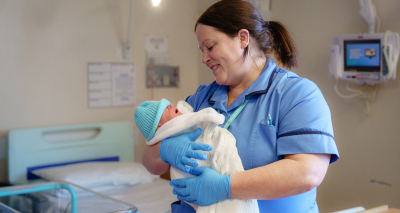Implementing a Strategy of Quality Over Quantity for Entry Level Positions to Future Proof the NHS Workforce
By 2031 the goal is for 28% of RGNs and over 30% of RMNs to be trained via Degree Apprenticeships, as set out by the NHS Long Term Plan. A target has been set in order for the UK’s nursing workforce supply to become sustainable, removing our overreliance on overseas supply.
I won’t begin to pretend to understand the complexities of how Trusts and training providers are to manage this increase in demand for education but what I do know is that through my experience of working with NHS providers is that the nurses, AHPs and Midwives who train via apprenticeships have a tendency to be exceptional therefore it’s an NHS target which I’m fully on board with.
One of the first things my team at Just R asks for when we begin to work with a new NHS partner is to be connected to members of the current workforce who represent the best of their values and culture. It is no coincidence that time and time again the people put forward to us are those who have progressed up through the organisations, often as apprentices.
What we find from these individuals is an extra level of loyalty and a greater appreciation of their positions, they are perceived as role models amongst their peers making them the obvious choice for Trusts to place them front and centre of recruitment campaigns aimed at attracting great people.
When we ask these ‘star’ employees to detail their career journeys a high percentage of them started out their careers as HCSWs / HCAs. This is also often the case when they have opted for the University route, as they have sought to gain baseline experience in entry-level roles prior to commencing further education.
This is why it is critical for Trusts to think strategically when filling their HCSW vacancies. This is your opportunity to future-proof your nursing workforce.


It’s no secret that there simply aren’t enough qualified workers out there, to fill the NHS vacancies and the forecast position is that this is going to only get worse. So the NHS (ICSs and Trusts) need to plan strategically now in order to ensure they have the people they need for the future, this is where the focus on entry-level careers needs to rise in level of importance.
Historically, NHS recruitment teams have relied on a constant stream of entry-level workers entering through a revolving door, often leaving again not long after they started. These workers typically apply in high volumes via NHS Jobs / Trac and there has been little to no focus on making sure these candidates were the best people for the job, the focus has been ‘a bum on a seat’ rather than the future of the nursing workforce. This mindset needs to shift in order to ensure the retention and development of entry-level workers.
For the past 2 years, we have been working with forward-thinking Trusts to develop long-term strategies such as Bradford Teaching Hospitals’ “Step into Kindness” campaign. These campaigns focus on reaching passive candidates who may never consider ‘an entry-level healthcare job’ but who would absolutely consider a first step into ‘a career in health’

What are the best practice tactics that we have seen to deliver successful outcomes?
- Apply focus on the development and clear communication of entry-level career pathways across all areas of need in the organisation
- Develop a long-term strategy to reach, attract, and engage with passive candidates. Include Schools and Colleges, the Armed Forces, employee referral schemes and targeted digital advertising to reach high volumes of passive candidates from within your communities
- Ensure that you have an effective method of converting passive candidates, regular recruitment events with interviews on the day to recruit in cohorts are an efficient strategy
- Put in place a robust cohort onboarding process, with new recruits matched the best they can be with areas in which they will succeed rather than simply where there is the greatest need.
All of the above is focused on both recruitment and retention as this is essential in order for the workforce to develop, the revolving door process is not effective in developing the workforce of tomorrow.
In order to succeed the strategy must be quality over quantity and proactive rather than reactive. The situation will not change overnight but through incremental but significant changes I am more than confident that the targets are achievable.
If you would like to talk through how a long-term attraction and retention strategy could be developed and implemented within your organisation please reach out through a direct message or email me at rachael@just-r.com. Me and my team would love to help!













